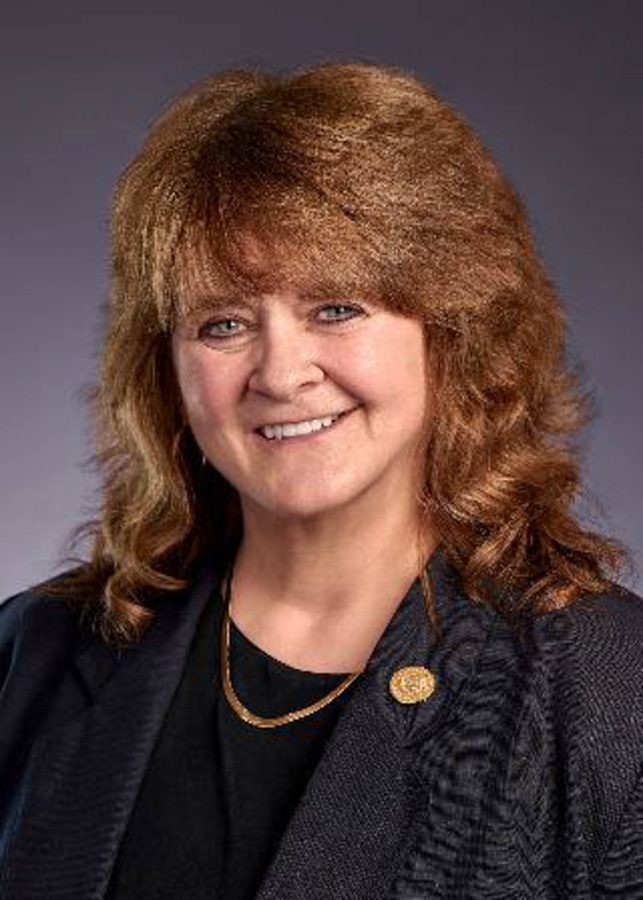Idaho ‘abortion trafficking’ law affects minors’ pregnancy options
Idaho Legislators are divided on the usefulness of the new law
District 33 Representative Barbara Ehardt, a Republican in Idaho Falls, voted in support of the bill.
April 18, 2023
House Bill 242 recently became law, which makes a non-parent adult helping a minor to obtain an abortion without parental consent a crime punishable by 2 to 5 years in prison in Idaho.
The law is set to go into effect May 5. The bill was first introduced on Feb. 28. On March 7, the bill passed the House 57-12 with one absence. On March 30, an amended bill passed the Senate 58-11 with one absence. On April 5, Governor Brad Little signed the bill into law.
The adult who provides what policymakers are calling “abortion trafficking” is criminally punished, the authority of which ultimately falls under the attorney general. Section 18-8807 of the law states civil action can be taken against the medical provider of the abortion by the father or grandparent of the preborn child, a sibling of the preborn child or an aunt or uncle.
District 33 Representative Barbara Ehardt, a Republican in Idaho Falls, voted in support of the bill. She said the bill is about parental rights.
“This legislation absolutely still allows for a parent to take their child across the lines for an abortion. It absolutely allows the parent to cede authority and allow a grandparent or an aunt or someone else to take that child across state lines for an abortion,” Ehardt said. “What this legislation does stop, however, is anyone else taking that child to go get an abortion without parental permission.”
It is kidnapping if you take someone else’s child and go out of state without permission as a non-parent adult does not have parental authority, she said. Except for cases of parental abuse, parents should be involved in the decision-making process of abortion because it is an emotionally difficult process with medical risks.
Sunday Henry, director of medical services at Cougar Health Services, said that an abortion has a similar risk level to going through with the pregnancy. With an abortion or spontaneous miscarriage there is a higher risk of infection, bleeding and adhesion. Adhesions, which are leftover scar tissue in the uterus, are not common, she said.
If a non-parent adult is concerned about a child who is pregnant, Ehardt said the adult should help the child have that difficult conversation with the parents. In the case of rape or incest, one should immediately go to police, who will be in a position to handle the situation.
Ehardt said said it would not make sense for the person who helped the child to just drop them back off at the house where they were abused, so therefore the police need to be involved quickly.
The law states, “A civil cause of action under this section may not be brought by a person who, through an act of rape, sexual assault, incest or other criminal conduct impregnated the pregnant woman seeking an abortion.” However, the law does not explicitly say if another family figure, who did not assault the child, can pursue a case.
District 19 Representative Chris Mathias, a Democrat in Boise who voted against the bill, is concerned about the unclear wording surrounding how many parents need to be informed.
“The fact that this is such a poorly written bill is kind of embarrassing as a member of the legislature because these are fixable things,” Mathias said. “The fact that parents are not defined here, and is defined in another section of statute, suggests that someone could try to circumvent this law.”
Ehardt said that the law does not strictly define parents because there is already an understanding of who parents are under Idaho Code.
In Idaho Code 16-2002 sections 11 and 12 state that “parent” is defined as a birth or adoptive mother or father of the minor or the married or unmarried biological father of a pregnant minor.
Ehardt said the law is not creating a situation where police are searching for people who helped a minor to receive an under-the-table abortion.
“If that parent never found out, because somebody did quietly take them, what are you going to do? We’re not not creating a witch hunt here,” she said. “We are saying that this is parental rights and we need to codify that.”
For women seeking guidance in Idaho state, the University of Idaho Women’s Center is available to help students and community members.
Lysa Salsbury, director of the women’s center in Idaho, said that she cannot refer students to any facilities that provide abortion, per state law. If a woman was seeking help for pregnancy, Salsbury would refer them to a physician or other medical professional to review their options.
“Now, if someone were to come to me, outside of work, on my own time, as a private citizen, I could [provide a referral]. I’m just not allowed to do it in my capacity as a state of Idaho employee,” she said.
Other resources the women’s center provides include educational programming surrounding gender-related issues, a food pantry, emergency funding, free menstrual products and confidential reporting in the case of a traumatic event.
Henry said when pregnant, a patient is presented with multiple options, depending on how they feel about the pregnancy. Abortion is presented just as any other form of medical care is.
She said the options for abortion, which are medication, aspiration or dilation and evacuation (D&E), depend on gestation. Gestation is most accurately measured in an ultrasound and can be accurately dated even in early stages of pregnancy.
Medication abortions are not available after the first trimester, or 11 weeks gestation, because of the decreased efficacy later in a pregnancy, she said. Aspiration is most common through 14 weeks of gestation and more advanced abortions require initial use of a vacuum followed by D&E.
Aspiration, a form of surgical abortion using gentle suction, is most common through 14 weeks of gestation, Henry said. More advanced pregnancies require D&E, which is the initial use of a vacuum followed by forceps.
According to the Centers for Disease Control and Prevention, 93.1% of abortions were performed at less than 13 weeks’ gestation and 0.9% of abortions were performed at greater than 21 weeks’ gestation in 2020. Out of overall abortions, 6.7% were reported to be surgical past 13 weeks’ gestation.
Planned Parenthood in Pullman, located on 1525 King Dr, provides medication abortion, according to their website. For pregnancies that are farther along, Henry said she looks to other places in the state, like Spokane, which provide alternate forms of abortion.

















